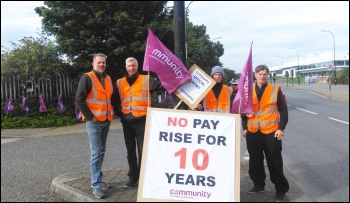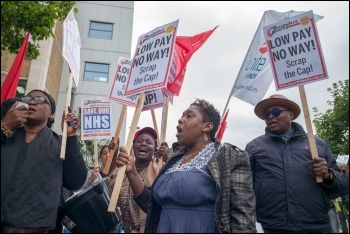Editorial of the Socialist, issue 973
After the budget – unions must launch pay fight
- Unison’s local government executive votes for pay ballot and national demo
Rob Williams and Glenn Kelly
Millions of public sector workers will be vainly sifting through Hammond’s budget for details of any pay rises.
The reality is that most of them will be looking down the barrel at a full decade of Tory pay caps, maintaining the catastrophe of the fall in living standards.
Two million local government workers and half a million civil servants didn’t even get a mention. NHS workers got a vague promise that a “funded” pay rise above the 1% pay cap may be on its way – but only if they are willing to accept changes to their terms and conditions in return.
Many workers will now be looking to the trade union leaders for what should be done next. The local government, civil servants and health unions rightly coordinated their pay claims to the employers and the government.
However a number of trade union leaders placed too much faith in the idea that the Tories would lift the pay restraint after the shock general election result and naively believed that all they had to do was write letters to MPs and lobby government “to do the right thing”.
Unions like Unison resisted the calls from Socialist Party members to prepare for action and not wait and lose time.
The truth is that the government’s real intentions were revealed early on. In the summer the teachers were only offered 1-2%; and then shortly after, the police and prison officers were offered “unfunded deals” of just above 1%.
Despite this, with the exception of the PCS, the unions prevaricated and valuable time was lost in getting the unions strike-ready to take on the government. It is critical that they now play catch up and act fast.
Put words into action
In September the TUC set out a strategy “To facilitate, organise and coordinate collective action and campaigns, including industrial action… organise a national demonstration… take immediate steps to develop a coordinated strategy of opposition to the pay cap within the public sector, including the sharing and coordinating of bargaining timetables and pay demands, campaign activities, tactics, ballots and industrial action.” But over two months later, only the PCS has put these words into action.
Its national consultative ballot on pay showed, like the CWU strike vote in Royal Mail, that the undemocratic thresholds in the Tory’s Trade Union Act can be overcome, providing that the unions prepare and commit to a real campaign that can mobilise members.
As a result, PCS is in a position to move to an official strike ballot. Correctly, it is seeking to use its mandate as a lever on the other public sector unions. But some union leaders are hiding behind dates of pay review findings and are delaying plans for action.
The biggest factor of all in the Tories’ vacillations on public sector pay is their divisions and weaknesses. The most outspoken ministers on pay have been the likes of Johnson and Gove, for their own opportunistic reasons.
Hammond claims to be hemmed in by the weak state of the economy, reflected in worse budget deficit figures on the eve of the budget.
In order to avoid having to pay up, the Tories had hoped to get away with creating the ‘deserving’ and ‘undeserving’ public sector worker.
However, instead all they now offer is more effective pay cuts for all. Mass strike action on the scale of the N30 public sector pensions strike (on 30th November 2011) could land a decisive blow against this crisis-ridden government.
Then, the TUC brought the public sector unions together and 29 of them balloted and took joint strike action in a walkout of two million workers. It shook Cameron and Osborne but they were let off the hook when the struggle was left at one day, instead of being escalated in the days and weeks following that successful action.
The worst thing the unions can now do is delay and prevaricate. The TUC should call an emergency meeting of the public sector unions to plan for coordinated strike ballots.
At TUC Congress, PCS General Secretary Mark Serwotka said that if the TUC is not prepared to act, the PCS would be prepared to convene such a meeting.
This would be welcomed by union reps and activists in unions such as Unite and Unison who have already got motions passed calling for consultative ballots. These ballots should be immediately put in place and built for as a step to move to official strike ballots.
Worryingly it appeared that the local government unions were going to wait for an offer from the employers on 13th December before even starting consultative ballots. This would put off action for months.
But today (23 November), after the budget which has offered nothing, Unison’s local government service group executive has passed a motion from the north west region – reflecting members’ anger and pressure – to instigate a consultative pay ballot to be set in motion before the end of this year, and for a national demonstration to be organised on pay.
Other local government unions should now follow this example.
The TUC have now called a national demonstration for 12 May 2018. Union members will welcome such a mobilisation, but many will want it to be brought forward to be part of a real strategy to build confidence for strike ballots on pay.
If this was done, it could rival the massive TUC demonstration of 26th March 2011 which saw up to 750,000 workers fill London.
That march was the starting point for the movement that resulted in the N30 strike that November. A mobilisation now, called by the unions and Jeremy Corbyn, that could reach out to the workers who have been involved in a wave of strikes in the summer and autumn in the private sector, would show what is possible and put Theresa May and Philip Hammond on notice.
This article was first posted on the Socialist Party website on 23 November 2017. It was updated on 29 November 2017 after the TUC announced a national demonstration for May 2018. The version printed in the Socialist is a shortened edit of this updated version.












